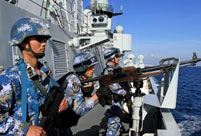 Luxury cars make Asia premiere at Auto China
Luxury cars make Asia premiere at Auto China
 Versatile dog
Versatile dog
 Ni Ni covers BAZAAR JEWELRY
Ni Ni covers BAZAAR JEWELRY
 Cherry blossoms reach peak bloom in Washington D.C.
Cherry blossoms reach peak bloom in Washington D.C.
 Top Chinese fashion icons in foreigners' eyes
Top Chinese fashion icons in foreigners' eyes
 Asia's largest business aviation exhibition to be held in Shanghai
Asia's largest business aviation exhibition to be held in Shanghai
 World's top-rated luxury hotels
World's top-rated luxury hotels
 Wu Jing, Xie Nan to hold wedding on May
Wu Jing, Xie Nan to hold wedding on May
 London Cake International attracts tourists
London Cake International attracts tourists
 Let's dance in harmonic Shaanxi
Let's dance in harmonic Shaanxi
 |
| Ships taking part in exercises off Qingdao opened to the public yesterday in the Chinese port city. China sent warships, supply ships, a hospital ship, helicopters and marines to take part in the exercises marking the 65th founding anniversary of the People’s Liberation Army Navy. (Xinhua Photo) |
MORE than 20 countries with interests in the western Pacific signed up to a framework maritime communication deal yesterday in what could be a major step toward ensuring that miscommunication between naval vessels does not develop into a conflict.
The Code For Unplanned Encounters at Sea provides simple instructions to be translated into regional languages that navies can use when they come across ships from other countries.
It’s hoped that the code will lessen the possibility of collisions or misunderstandings that could lead to conflict in the heavily trafficked sea lanes surrounding China, Japan and Southeast Asia.
Tensions have been rising in the region over competing territorial claims, especially over the Diaoyu Islands in the East China Sea.
The agreement, approved unanimously at the Western Pacific Naval Symposium in the eastern Chinese port city of Qingdao, is targeted at “establishing international standards in relation to the use of the sea.”
China, the United States, Japan, the Philippines, Malaysia, South Korea, Thailand, Australia, Canada, Mexico, Chile, Peru and several other nations signed on to the framework.
China’s navy commander, Admiral Wu Shengli, welcomed the accord.
Addressing the symposium yesterday, Wu said it was a means for closer cooperation in humanitarian missions, as well as a way to avoid misunderstandings.
“For the sake of the extremely precious peace we enjoy at present, we need to ... try to avoid extreme behaviors that may endanger regional security and stability,” Wu told those taking part in the symposium, who included US Chief of Naval Operations Jonathan Greenert.
Xu Hongmeng, vice admiral in the People’s Liberation Army Navy, said that the agreement would have a positive impact on maritime conduct, emphasizing that it was voluntary.
But he added that it would have no impact on conduct in the disputed waters of the East and South China Seas.
“You can’t say that it’s related to the issues in the South and East China Sea — this is about the navies of many countries,” Xu said. “This will not influence those issues.”
US Navy officers said the code was based on protocols already used by the US military and its allies.
It had been discussed among Asia-Pacific states for more than a decade, but legal and linguistic barriers were overcome only in the past year.
While ships at sea already talk over the radio, the accord seeks to standardize those communications with code phrases, the meaning of which have been translated into local languages.
“Bravo” indicates a ship is conducting weapons practice, reassuring other craft that they are not being fired at. “Foxtrot” means the ship is launching or retrieving helicopters or other aircraft.
While that doesn’t guarantee conflicts won’t occur, it does give regional navies a standard way to communicate and avoid incidents such as the December 5 near-collision between a US Navy cruiser, the USS Cowpens, and a ship accompanying China’s sole aircraft carrier in international waters in the South China Sea.
US Navy officials said the Cowpens maneuvered to avoid crashing into the Chinese ship in the two nations’ most serious sea confrontation in years.
China’s Navy intends to send a pair of destroyers, an oiler and a hospital ship to join in US-led, 23-nation naval drills near Hawaii, building on a trend of integration with foreign navies begun in 2008 when China committed ships to anti-piracy patrols off Somalia.
The WPNS was established in 1987 to promote pragmatic cooperation between the navies of member countries, strengthen mutual understanding and trust, and safeguard regional maritime security. It comprises navies whose countries border the Pacific Ocean region.
The Qingdao meeting is the first time China, one of its 12 founding members, has hosted the biennial symposium.
The symposium was to have included an international parade of navy ships, but that was canceled, ostensibly due to the search for Malaysia Airways Flight MH370 which continues in the southern Indian Ocean.
 Beckham launches fund to support youth soccer in China
Beckham launches fund to support youth soccer in China Cherry blossoms hit peak bloom in Washington D.C.
Cherry blossoms hit peak bloom in Washington D.C. Children in ancient costumes learn Zhusuan
Children in ancient costumes learn Zhusuan Tens of thousands celebrate Water Splashing Festival
Tens of thousands celebrate Water Splashing Festival A bite of China II whets the appetite
A bite of China II whets the appetite Chinese frigate completes its 14th escort mission
Chinese frigate completes its 14th escort mission Let's dance in wealthy Shaanxi
Let's dance in wealthy Shaanxi A date with 798: feel the art around you
A date with 798: feel the art around you 3D-printed houses built in Shanghai
3D-printed houses built in Shanghai The backstage of the Fashion Week
The backstage of the Fashion Week College students in Han costumes
College students in Han costumes Postgraduate works as waitress
Postgraduate works as waitress Life in a Lahu village in Yunnan
Life in a Lahu village in Yunnan An orphan’s wedding
An orphan’s wedding Hollywood documentary brings Diaoyu Islands truth to new audience
Hollywood documentary brings Diaoyu Islands truth to new audienceDay|Week|Month